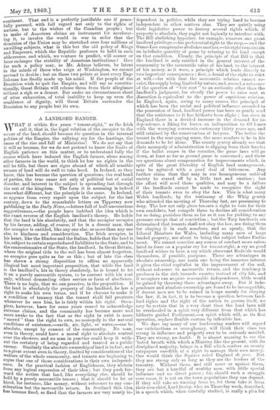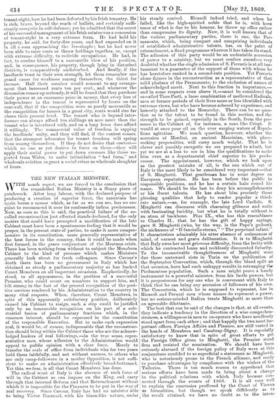A LANDLORD DANGER.
WHAT if within five years " tenant-right," as the Irish call it, that is, the legal relation of the occupier to the owner of the land, should become the question in the internal politics of the Empire, the rallying cry for the hustings, the cause of the rise and-fall of Ministries ! We do not say that it will so become, for we do not pretend to know the limits of English patience on this matter, or to understand fully the causes which have induced the English farmer, alone among other farmers in the world, to think he has no rights in the soil he tills, but there are signs abroad of which all sensible owners of land will do well to take heed. In Ireland, as they know, this has become the question of questions, the real bond of parties, the true cause not only of political but of social disorder, and interest in the subject is spreading fast through the rest of the kingdom. The form it is assuming is indeed somewhat different, but the principle is the same. In Ireland, as appears from every report upon the subject for the last century, down to the remarkable letters on Tipperary now publishing in the Daily News,—letters full of half-unconscious suggestiveness,—the people have imbibed the idea which is the exact reverse of the English landlord's theory. He holds that the land is his absolutely, and that the occupier occupies by his favour, adding, of course, if he is a decent man, that the occupier is entitled, like any one else, or more than any one else, to kindness and consideration. The Irish occupier, in his heart, like the Hindoo and the Italian, holds that the land is his, subject to certain superinduced liabilities to the State, and to the concessionnaire of the State, the landlord. In Great Britain, where the original title to the soil has been almost forgotten, no occupier goes quite as far as this ; but of late the class has shown a strong disposition to affirm an apparently illogical but most important proposition, that while the land is the landlord's, his in theory absolutely, he is bound to let it on a purely mercantile system, to be content with his rent only, without demanding other service or form of obedience. There is no logic, that we can perceive, in the proposition. If the land is absolutely the property of the landlord, he has a right to make his own terms, and if he chooses to make it a condition of tenancy that the tenant shall fall prostrate whenever he sees him, he is fairly within his right. Occupiers, however, have for some years ceased to acknowledge extreme claims, and the community has become more and more awake to the fact that as the right to exist is more " sacred " than the right to own, no monopoly in the natural conditions of existence,—earth, air, light, or water,—can be -absolute, except by consent of the community. No man, even in theory, could have a moral right to absolute control over the showers, and no man in practice could keep it without the certainty of being regarded and treated as a public enemy. Similarly the absolute ownership of land is in fact, and to a great extent even in theory, limited by considerations of the welfare of the whole community, and tenants are beginning to argue that one of those considerations is their own independence. In the practical fashion of Englishmen, they abstain from any logical expression of their idea ; but they push forward the notion that land, like everything else, should be held by a purely mercantile tenure ; that it should be let or hired, for instance, like money, without reference to any consideration but the mercantile return. In Scotland this idea has become fixed, so fixed that the farmers are very nearly in
dependent in politics, while they are trying hard to become independent in other matters also. They are quietly using their legislative power to destroy several rights which, if property is absolute, they ought not logically to interfere with. The Bill abolishing hypothee, for example, removes one great landlord privilege,—his preferential right to the crop,—and the Game-Law compromise abolishes another,—his right to maintain an indefinite quantity of game by refusing to let land except on that condition. Clearly, the principle of that Bill is that the landlord is only entitled in the general interest of the community to the mercantile value of his land, to the interest of his money, as it were, a principle which leads directly to two important consequences ; first, a denial of the right to evict at will,—for with that the mercantile relation cannot coexist, the supply being limited by nature, and, second, a reference of the question of " fair rent " to an authority other than the landlord's judgment, for clearly the power to raise rent at discretion is equivalent to the power of capricious eviction. In England, again, owing to many causes, the principal of which has been the social and political influence accorded to the possession of land, landlord power has been so gently used that the resistance to it has hitherto been slight ; but even in England there is a decided increase in the demand for independence, a liking for leases, an indisposition to fill leases with the worrying covenants customary thirty years ago, and still retained by the conservatism of lawyers. The better the tenant in the rent-paying sense, the more resolute is he in his demands to be let alone. The county gentry already see that their monopoly of administration is slipping from their hands; if the ballot comes in the counties, the game laws will go down, at least as far as ground game is concerned ; and there are questions about compensation for improvements which, in spite of the great liberality of English land management, may be agitated with a good deal of bitterness. Any further claim than that may in our homogeneous uniditad society be staved off by a little tact and caution ; but the effort will need those qualities, and may be a failure if the landlords cannot be made to recognize the right of their tenants even to obey the law. This is what many Welsh landlords, by the testimony of the Whig gentry who attended the meeting of Thursday last, are presuming to deny. The law not only gives tenants a right to vote for their own candidate, but compels them to decline all consideration for so doing, punishes them so far as it can for yielding to any pressure except that of conviction ; but the Tory landlords are determined that tenants shall not obey the law, are fining them for obeying it in such numbers, and so openly, that the Liberal Members for Wales, including many men of large landed property, are about to bring the subject before Parliament. We cannot conceive any course of conduct more calculated to force on a popular cry for tenant-right, a cry no good landlord wishes to hear, a cry which observant Radicals would themselves, if possible, postpone. There are advantages in absolute ownership, one main one being the immense interest it gives the chief capitalist in the improvement of the soil, without reference to mercantile return, and the tendency it produces in the rich towards country instead of city life, and if occupiers can acquire reasonable independence, little would be gained by throwing these advantages away. But if independence and absolute ownership are found to be incompatible, if decent men are to be ruined in heaps merely for obeying the law, if, in fact, it is to become a question between landlord rights and the right of the nation to govern itself, we may be certain that in a very short time the land laws will be overhauled in a spirit very different from that which has hitherto guided Parliament,—a spirit which will, as its first operation, replace flexible custom by inflexible law.
We dare say many of our landowning readers will regard our vaticinations as over-gloomy, will think their class too strong in influence and property ever to be seriously assailed. They are strong, no doubt. It is almost amusing to see the 'bated breath with which a Ministry like the present, with its disciplined majority, brings in a Bill which confers on county ratepayers one-fifth of a right to manage their own money. One would think the Squires ruled England de fare. But they are strong only so long as they are the leaders of the tenantry. Without them, and still more as against them, they are but a handful of wealthy men, with little special influence and no direct power ; for, should such a struggle ever come, it is not on the town populations they can depend. If they will take no warning from us, let them take it from their own chief, Lord Derby, who, on Thursday week, described, in a speech which, when carefully studied, is really a plea for tenant-right, how he had been defeated by his Irish tenantry. He is rich, brave, beyond the reach of bullets, and certainly sufficiently energetic in self-defence; yet he admitted that the secret of his successful management of his Irish estates was a concession of tenant-right in a very extreme form. He had held his property, he said, for forty-five years, and had expended on it in all a sum approaching the fee-simple ; but he had never been able to raise rents or throw holdings together, or, except with extreme difficulty, to redivide occupations. He had, in fact, to confine himself to a mercantile view of his position, and, in consequence, his property, though lying in disturbed districts, is comparatively undisturbed. And finally, if the landlords trust in their own strength, let them remember one grand cause for weakness among themselves, the thirst for income. Half their number would consent to any arrangement that increased rents ten per cent., and whenever the discussion comes up seriously, it will be found that they purchase their power at an enormous price in money, that every loss of independence in the tenant is represented by losses on the rent-roll, that if the competition were as purely mercantile as the competition for houses in a great city, rents would rise far above their present level. The tenant who is beyond interference can always afford ten shillings an acre more than the tenant who is interfered with, and on a long lease does afford it willingly. The commercial value of freedom is sapping the landlords' unity, and they will find, if the contest comes, that the strongest advocates for tenant freedom will spring from among themselves. If they do not desire that contest— which no one as yet desires to force on them—they will apply their social power to put down excesses like those reported from Wales, to make intimidation " bad form," and wholesale eviction as great a social crime as wholesale slaughter of foxes.































 Previous page
Previous page